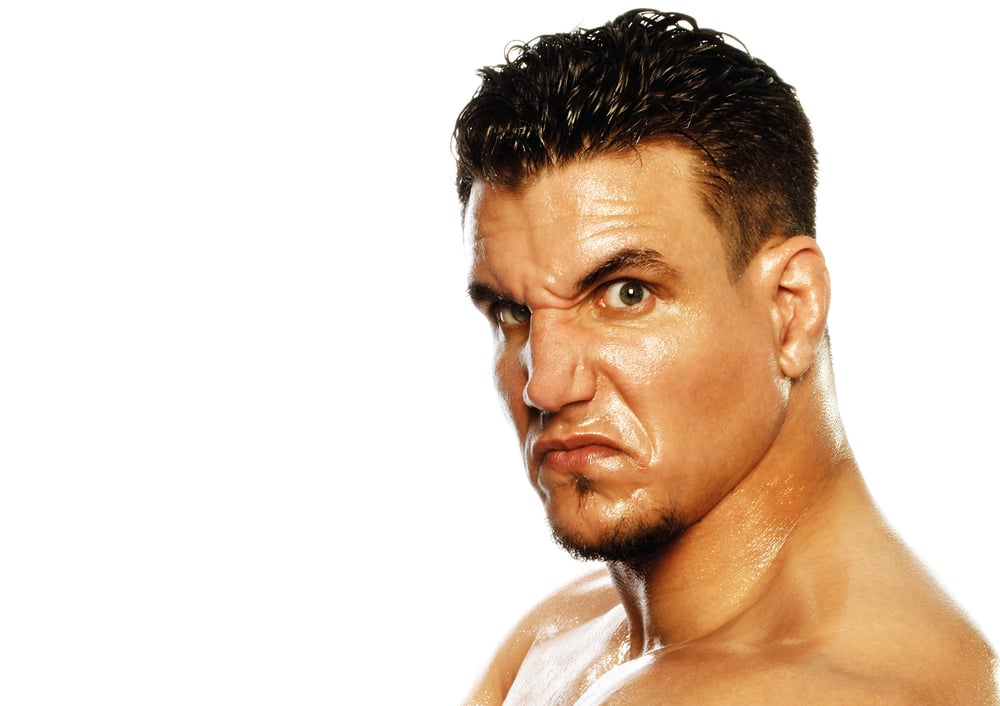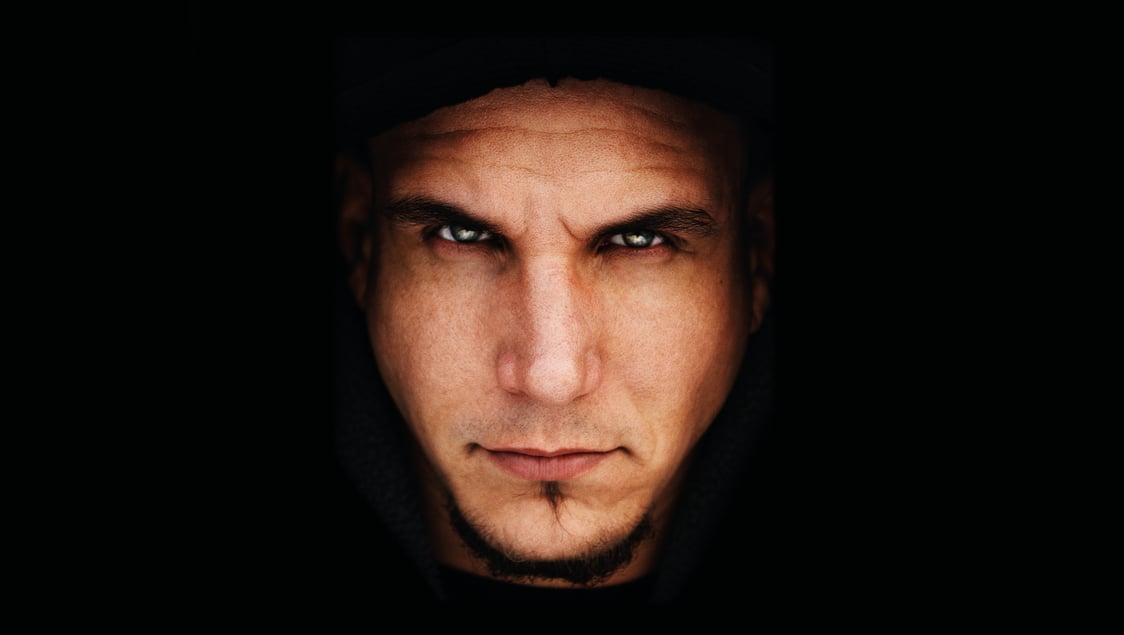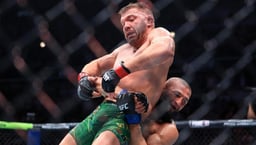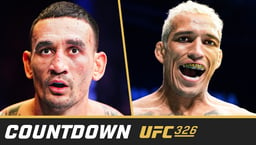
Issue 057
December 2009
Fans haven’t seen or heard from Frank Mir since his loss to Brock Lesnar at UFC 100. The former heavyweight champion isn’t sat at home depressed, inconsolable in defeat. Instead, he’s busy reinventing himself in order to become a stronger, quicker and more explosive heavyweight with one goal in mind: to end Brock Lesnar’s career.
UFC 100 was a huge show befitting the historic status of the event. A landmark in the promotion’s history, it was only fitting that the main event should feature two of the sport’s top heavyweight fighters. On one side of the Octagon, Frank Mir, a two-time heavyweight champion, 6’3” and 245lb of black belt-level jiu-jitsu and the holder of the interim heavyweight title. Facing him was the man mountain Brock Lesnar, 265lb of muscle, also the heavyweight champ and a former national-level wrestler who, in only his fourth professional fight, had knocked out the legendary Randy Couture.
Over 1.5 million members of the American public watched them fight for the undisputed heavyweight title on pay-per-view; another 10,000 crammed into the Mandalay Bay Events Center; and nobody can be quite sure exactly how many around the world would have watched the fight. The first time they had met, Mir submitted Lesnar with a leglock 90 seconds into the fight. All eyes were on Mir; could he do the unthinkable once again? Unfortunately for Mir, the rematch went very, very differently.
“I underestimated Brock’s strength and his ability to use it – his strength with technique,” says Mir, poised over a plate of sushi, his favorite food. “He didn’t make that many technical mistakes. For his part, he really cleaned up his game in creating any opportunities for me to capitalize on. In the past, I’ve fought strong guys who didn’t use their technique properly. The combination of the two worked out to be more than I could overcome that night.”
Two notable things happened as a result of Mir losing that fight to Lesnar. First, he failed in his attempt at becoming undisputed champ. Second, an adrenaline-fuelled Lesnar got up in Mir’s face, shouting at his bloodied and dazed foe. You might be surprised as to which hurt Mir the most.
“Being the heavyweight champ or the interim champ, I got to be honest, I didn’t really feel that different walking around. I still felt like, it was ‘Okay, you’ve accomplished that, now on to your next fight.’ There was no ‘I made it.’ Some people think that with the belt – that you made it. Nah, you didn’t make shit. You won a fight, just the fight happened to have more ribbon and bells and whistles on it.”
“So it was the post-fight incident that upset you most?” I asked.
“Very much so. I’ve learned that when you express feelings, you get them off your chest and they go away. So this is something I really don’t want to express too much. It’s something I want to contain so that I can show him next time we fight. Above all else I want to accomplish in the ring, I want a rematch.”

Frank Mir is an intelligent man. He might not boast the academic career of Rich Franklin and didn’t leave a promising white-collar career like Kenny Florian, but Mir is smart. He’s a big reader and a fan of texts such as The Art of War and A Book of Five Rings, both seminal works on strategy that can be applied to martial arts, business, or a variety of situations. In cases such as Mir’s, he draws upon the works (which he describes as “immensely” important) to help him navigate his way through the tests life throws his way. “If I hadn’t had a sound game plan how to attack life itself, I wouldn’t have made it back to the level that I have, because of some of the adversities that I’ve faced and the injuries that have come about.”
The adversities Mir speaks of are well documented. In 2004, he was struck by a car while out riding his motorcycle with his younger brother, Robert. The injuries he sustained in the accident threatened to end his athletic career, and this was mere months after he had won the UFC heavyweight title for the first time by memorably snapping Tim Sylvia’s arm.
Because Mir has known not only the bitter taste of defeat, but faced the deep, dark hole of despair from on the edge of an abyss, the loss to Lesnar hasn’t affected him as you might think. Yes, he’s upset he lost. Yes, he’s pissed off at the way Brock treated him after the fight. But will he lose sleep over it? No way.
“As far as impact [the loss to Brock] has made on my life, I’d say this was one of the more minimal losses, because I’ve had losses in the past where I’ve had to revamp everything, I was doing everything wrong. Training for Brock, I was doing 90% of it right. I haven’t changed a whole lot except the strength training aspect of my game.”
Two days before our conversation over sushi, we watched Frank get put through his paces at the Philippi Sports Institute in Las Vegas. Founded by champion strongman Mark Philippi, it is home to many athletes from the NFL and NHL, as well as strongmen, swimmers, boxers and more.
As Mir gets ready to work his way through another grueling set of deadlifts, it’s not hard to see the change in his physique. Frank has always been one of the bigger heavyweights in the UFC, consistently weighing in between 245–255lb for his fights, but he looks bigger and judging by the weights he is moving, a lot stronger. With the arrival of men such as Carwin and Lesnar (who could just as easily compete in the super heavyweight division), it is highly apparent that size does matter.
“You know, there is a reason there are weight classes. If two guys are the same size but one is a lot stronger than the other, that helps. I had to fix that. The thing I learned in the Lesnar fight was strength helps – a lot.”
Mir is a big guy, and a guy that size can move some big weights. The plates that rack up on either side of the barbell he hoists off the floor are impressive enough, but when he bends over and grabs a stack of 100lb plates and starts lifting them with his bare hands, it ceases to become impressive – it’s downright awe-inspiring. As Mir explains, it’s all about “picking heavy things up and exploding with them at weird angles.”

The training on offer at PSI is among some of the best in the country. Ranked as one of the top 30 gyms in the USA, Philippi trains athletes from all disciplines to become fitter, stronger and more explosive – just what Mir wants. He’s been training there for two months, and he loves the difference it has made. “I’m a lot more explosive, even in my rolling now. In the last few years I lost that edge to be able to explode and grab someone’s arm and take it off the hinges. I’ve become more ‘pick and choose my spots’, maybe just because I was working so much on striking. In the past I rolled so much I was able to develop that explosiveness doing that, but since I’ve got away from that, I’ve lost it. Coming in here and training the nervous system, I’ve got that back where if people make a mistake when we’re rolling, it’s over with. I can explode and not be fatigued, or not hesitate because I’m afraid I’ll be fatigued.”
Another area in which Mir has been working with some new trainers is his striking, hooking up with the Muay Thai experts from the famous Sityodtong team in Boston. “Marc Dellagrotte and Peter Pinto, one of his striking coaches from Sityodtong, they’ve got phenomenal striking,” says Frank with genuine respect. The sessions that he has done with Dellagrotte and Pinto have given him a new outlook on striking, something that isn’t easy when you’ve spent as long in the fight game as he has. “I think every time I walk away from practice, I’m a better striker. In the past, it always felt like, ‘Okay, you know enough striking, now it’s about being in better shape.’ That always seemed kind of limiting to me – I was like, is it that simple? Is it just about cardio? But then you learn that no, cardio is one facet of it, but it doesn’t make up for lack of technique.”
In the past, Mir has attracted criticism from all quarters for seeming unprepared for some of his fights. Described by Dana White as “so talented”, the UFC president lamented on what he saw as Mir’s arrogance. “When I think of him and try to draw a comparison, the only person I can think of who is a fair one is BJ Penn,” said White in 2008. “When they came into the UFC, they were young and cocky and had all the ability in the world. They were able to do things that other guys could never even think of doing, so they didn't have to work as hard as the others did.”
Mir doesn’t like the ‘naturally talented’ label as he feels that it doesn’t do him credit. “I think it can detract from my accomplishments. I would like to think I learned everything the first time it was showed to me, but it still takes time to train. Sometimes I think people throw the naturally talented mark at you as a way of detracting from your actual work.” As the heavyweight division becomes home to giant athletes who can fight instead of large men who can scrap, Mir’s commitment to developing as an athlete is stronger than ever. “I’m trying to become a bigger, stronger athlete. I don’t want to go out there and suffer, like against Brock, who did a good job of fighting me using his superior size and strength and good technique.”
With a line that sounds like it could have been plucked from one of the ancient Eastern texts he has studied, Mir states: “Being content with yourself is detrimental towards increasing your abilities.”

With the July fight against Brock pushed to the back of his mind, Mir is looking forward. His return to the Octagon will be a tough test; he meets French striker Cheick Kongo. Some might make a snap judgment based on Kongo’s label as a kickboxer and Mir’s tag of submission specialist, but this is anything but a ‘style vs style’ encounter. “It’s a tougher fight than a lot of his [Kongo’s] detractors make out. They don’t take into account that he’s very strong, very big, an agile athlete who’s very adept, probably one of the better strikers right now in the heavyweight division.”
Kongo is also a veteran of 20 MMA fights and over 20 kickboxing fights. The giant Frenchman, a highly athletic and lean 6’5” hurt machine, has never lost by submission. “And looking at his fight with Cain Velasquez, I don’t think many people are taking into account that he took that fight on two or three weeks' notice,” says Mir of Kongo’s last fight. “He had Cain hurt several times. I don’t think it’s going to be as easy as some are making it out to be. He’s improved a lot on his grappling and he’s a very dangerous ground-and-pound guy.
“The fight has to start on its feet, and he knows that if I take him down I have a pretty good advantage. So that’s going to be the game. If we started in the clinch maybe it’d be a little bit easier, but seeing as we’ve got to start at opposite ends of the cage, there is going to have to be some striking regardless of whether I want it to go to the ground or not.
“I think I’ve made leaps and bounds adding to my game besides just grappling. I think even the Brock fight, in the few seconds it was on the feet, I think I did better than I did on the ground. If I was really that adept at grappling I could have done a little better. I think both of us [Mir and Kongo] have made strides in becoming a lot more well-rounded.”
Mir could put himself in a bad position were he to look past Kongo. The Las Vegas native has no intention of making that mistake (“I have to crush him to show I’ve improved”) but his sights are still set on one man: Lesnar. “Above all else, I want to accomplish in the ring, I want a rematch,” he says.
There is an edge to Mir’s voice. This is no empty threat, no sound bite purely for the press; he really wants nothing more than to beat Brock Lesnar. “[I want] to end Brock Lesnar’s career. Really, it’s what I think about all the time. Cheick Kongo is in the way of that dream.”
What about the title? “Getting the title back, it’s a nice, novel idea, but Brock Lesnar exploited a huge weakness in my game. I have to crush him to show I’ve improved that weakness. It’s nothing about how he talked to me in my last fight – I couldn't care less about it. If I took it that personal there are other ways to handle a situation like that outside of a cage, but honestly I just want to fix what was exploited. If you’re a true martial artist you don’t do it for money or titles, just to be the best human being possible, and if someone exploits a weakness, who better to see if you’ve fixed it than the guy who exploited it?
“I will face this loss. It was embarrassing and hard to accept, but I will get back on my feet, go out there and try again and set myself up for a rematch. Everybody else knows, if they’d been me, they would have flown to the top of a mountain and stayed there, lived in a cabin, grew out a beard and detached completely from society, because humans, especially a lot of people I come into contact with, are cowards because of fear of loss.
“You’ll see a few guys go out there in life and try, and there is no guarantee of success. In the end, I might not have a happy ending, but fuck, I’m writing my own story. Everybody else is sitting in their house, watching TV, blogging on the Internet, and those losers will never ever be remembered after the day they die. Their grandchildren won’t even remember their full name. But your grandchildren will remember my name.”
Written by Hywel Teague, with contributions from Gary Alexander.

Frank Mir: Career timeline
2001: Makes his MMA and UFC debuts at only 21 years of age
2002: Taps Pete Williams in less than a minute with what is now called the ‘Mir-lock’. Suffers first loss to Ian Freeman.
2004: Snaps Tim Sylvia’s arm and becomes the UFC heavyweight champion. Suffers horrendous injuries in motorbike accident and is out for 18 months.
2006: Returns to the UFC but loses in first round to Marcio Cruz. Suffers a second first-round loss to Brandon Vera.
2008: Spoils Brock Lesnar’s UFC debut with a leglock 90 seconds into the first round. TKO’s Nogueira and wins interim title.
2009: Vows revenge after losing to Lesnar at UFC 100.
...









